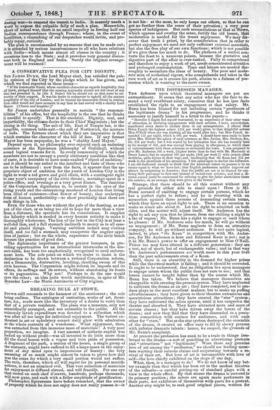A CONSERVATIVE PLEA FOR CITY DIGNITY.
SIR JAMES DIIKE' the Lord Mayor elect, has satisfied the pub- lic opinion of the City by the pledge which he has given, and which we find reported in these terms- " If his honourable friend, whose excellent character as regards hospitality they all knew, pledged himself that the ensuing mayoralty should not fall short of any that had preceded it, he (Sir J. Duke) felt he should not on that score be un- worthy of their support. It was his desire to endeavour to uphold all the ancient hospitality of the city of London; and he trusted his honourable friend in retiring from office would not have occasion to say that he had served with a shabby Lord Mayor. (Cheers and laughter.)"
Sir James undertakes generally to sustain "the responsi- bilities" of his office, but the hospitality is the one that he thinks it needful to specify. That is the essential. Dignity, zeal, and impartiality, the citizens desire in their Chief Magistrate ; but the dining is the thing. The salt of life, East of Temple bar, is the tangible, common table-salt—the salt of Northwich, the muriate of soda. The fairness about which they are imperative is that which sustains the character of the bill of fare. If any former Mayor has been unpopular, he was a "shabby Lord Mayor." Depend upon it, no philosophy ever enjoyed such an enduring existence as the Epicurean philosophy of Guildhall, without sound logical reasons for it. In every community of which the members are not to occupy a purely stationary condition like that of caste, it is desirable to have some exalted "object of ambition," and it should be one suited to the intellect and taste of those who are to be influenced : now from the facts, it appears that the ap- propriate object of ambition for the youth of London City is the right to wear a red gown and gold chain, with a contingent right to one year's occupancy of the civic throne ; mornings spent in a police-office, and evenings at a very great dinner. The function of the Corporation dignitaries is, to sustain in the eyes of the rising youth and the enterprising manhood of London that living bean ideal of existence—that flower of beauty, that archetypal form of human perfectibility—to show practically that there are such things in life.
Even for those who are without the pale of the feasting, as not yet of the elect, or as being too old to hope for more than a view from a distance the spectacle has its consolations. It supplies the hilarity which is needed in every human activity to make it thoroughly wholesome. The lion of the law in the City is at least a well-fed lion, and a full stomach inclineth to mercy as to all ease- ful and placid things. Vaulting ambition indeed may o'erleap itself, and too full a stomach may exasperate the angrier appe- tites of justice ; but on the whole, experience of the civic bench favours the practice of good diet.
The diplomatic importance of the greater banquets, in pro- viding opportunities for an international intercourse at the des- sert-table, has been too emphatically recognized to need enforce- ment here. The sole point on which we desire to insist is the distinction to be drawn between a rational Corporation reform, and a Democratic, destructive, levelling, shocking sweep of this civic heaven. The Corporation might reformits imposts and its offices, its suffrage and its sewers, without abandoning its feasts or its pageantries. Why not? Perhaps to do the one would save the other; an idea quite worth meditation, in spite of Mr. Recorder Law—the Marie Antoinette of City regime.


























 Previous page
Previous page